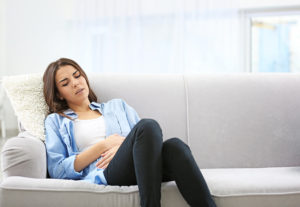
PMS – or Premenstrual Syndrome – is something that 85% of women experience. The degree of symptoms varies ranging from minor cramping or food cravings to severe pain and migraine headaches.
For many women, even moderate PMS affects their parenting, work and or social life and for at least 5% of all menstruating women, the symptoms of PMS are so severe that they are incapacitated monthly during this time.
PMS symptoms are from the following factors: hormonal imbalances, imbalances in the stress hormones, and the neurotransmitters (chemicals that control mood). But the underlying causes of PMS include:
- Nutrient deficiencies (especially magnesium, calcium, B12, B6, iodine, vitamin E, vitamin D and vitamin A)
- Blood sugar dysregulation – a very high factor in other estrogen metabolism issues (i.e. PCOS and uterine fibroids)
- Environmental factors, especially excess estrogen from plastics and other chemical exposures
- Stress (relationship, marital/sexual difficulties, workplace stress, money, etc.)
- Endocrine problems: adrenal and thyroid problems can also cause PMS, so have your doctor check your thyroid and adrenal hormones and function to make sure these are in proper order.
We provide affordable Lab Testing to determine Adrenal and Thyroid function, as well as Hormonal Imbalances
PMS symptoms are greatly affected by diet. The week before your period or your PMS week is where a plant-based diet can make a huge difference!
Mediterranean-style meals are easiest because they include many of the foods that help to ease PMS. A daily serving or two of dark leafy greens such as kale, collards, and broccoli and good quality fats are one of the best combinations to happier hormones. The high fiber content of vegetables can help the body to effectively eliminate excessive hormones from the large intestine to prevent reabsorption of hormones, particularly estrogen.
Daily intake during this week of legumes (think chickpeas and black beans) can support the production of hormones if/when there is a deficiency.
Dairy products and meat that is not organic or pasture raised/fed/finished need to be kept to a very low minimum to avoid any excess hormones coming into your system (better yet, keep them out of your diet in general). Include cold-water fish (such as salmon, cod and other low-mercury fish) a couple of times a week or take a high-quality fish oil supplement. Dietary fats should come from extra virgin olive oil, avocado oil and coconut oil, olives, avocados, coconut (coconut yogurt!), and nuts and seeds (pumpkin, Brazil, macadamia, chia, flax, and hemp seeds are best).
Women who experience PMS symptoms crave and consume significantly more sugar, bad fats, dairy products, salt and refined carbohydrates than those who do not have PMS. Caffeine intake has also been linked to premenstrual discomforts, especially breast tenderness. Cutting out sugar, all white-flour products and caffeinated items such as coffee, black tea, and sodas will help to relieve symptoms. The good news when it comes to PMS cravings- dark chocolate (68% or greater) is the exception to the caffeine rule and it can help improve mood and prevent or relieve depression (insert sigh of relief here)!
Adequate protein and fat at each meal will keep your blood sugar balanced – no dips or peaks- exactly where you want it to be to avoid the ups and downs of PMS like depression, cravings, mood swings, cramps and headaches. Think about meals like salmon with a sweet potato and asparagus or sautéed scallops and kale over spaghetti squash or a wonderful bowl of lentil soup. Meals like pasta, grilled cheese, pizza, fried chicken, bagels and cream cheese and cereal are best avoided especially during PMS and period weeks.
In addition to a healthy, nutrient dense diet, several herbs and supplements have shown to be beneficial in reducing PMS, particularly for improvement of mood, reduction of bloating, and reduction of breast tenderness. These include:
- Calcium citrate (up to 1,200 mg per day)
- Magnesium glycinate (400 mg per day)
- Vitamin B6 (50 mg per day as part of a methylated B-complex supplement)
- Vitamin E ( 400 IU per day of a non-soy based)
- DIM (Diindolylmethane) standardized to 25 mg of 25% diindolylmethane, from Brassicacae vegetables
- Flax seed, 2 TBS fresh ground daily
- Vitamin D3/K2
- Evening primrose oil in a dosage range of 1,500 to 3,000 mg daily (some find it helpful others don’t however Udi’s oil can be helpful for the added fats!)
- Milk thistle
- Vitex or Chaste Tree Berry
- Black Cohosh
- Eleuthero, Schisandra and Ashwaganda are adaptogens that can help your energy and mood during PMS
Sometimes improving one factor alone can help symptoms, but like most issues a combination approach of improved diet and nutrition intake, improved lifestyle habits (for example adequate rest, moving the body more through exercise and yoga, meditation, stress reducing activities), acupuncture, and herbal and nutritional supplements are needed.
And one last small tip – although this sounds simple, improving your thoughts about your menstrual cycle and PMS can also help. Calling it “a curse” or dreading that time of the month can make it worse. In many cultures, a women’s menstrual cycle, period, “moon time” are magical times bringing with it powerful things. Find ways to think positive about your PMS week approaching your period. Perhaps schedule something that you can look forward to that also includes self-care like a monthly massage or pedicure during that week. Use your PMS week to nurture yourself, eat well, rest and relax… have a happy period!
Learn how adding Acupuncture, and also Chinese Herbs, to diet and lifestyle changes can greatly ease PMS.
Ready to take an holistic approach to your health? Call us today for a free consultation with one of our acupuncturists that incorporate nutrition and herbs to treat PMS.
 Amy Carlson is a Holistic Nutritionist who practices a whole-foods based approach in helping the body to heal and thrive. She has a strong interest in sharing what she has learned so that everyone has the opportunity to live in a healthy body. “Each body has the ability to heal if it is given what it needs and the understanding of why it is hurting is discovered and nurtured as well.” Learn more about her approach to wellness by visiting her website
Amy Carlson is a Holistic Nutritionist who practices a whole-foods based approach in helping the body to heal and thrive. She has a strong interest in sharing what she has learned so that everyone has the opportunity to live in a healthy body. “Each body has the ability to heal if it is given what it needs and the understanding of why it is hurting is discovered and nurtured as well.” Learn more about her approach to wellness by visiting her website
